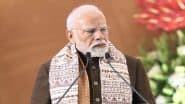New Delhi [India], November 7 (ANI): Global currencies are depreciating against US dollar following Donald Trump's victory in the U.S. presidential elections. The impact is particularly strong on emerging markets (EM).
While many EM Asian countries have been hard hit, India's position is somewhat better due to its relatively lower dependency on trade with China, according to a report by Emkay.
The report noted that India has the smallest exports-to-GDP ratio and the lowest share of exports directed towards China among its EM peers, making it less vulnerable to fluctuations in Chinese demand.
"India is relatively better placed on China trade linkages vs EM Asian peers, having both the smallest exports/GDP ratio and the smallest share of exports going to China" said the report.
However, the report stated that India's trade links with China and the broader Asian region have grown significantly over the past decade. As a result, India is not completely shielded from potential "second-round" effects if China's economy slows further, especially given a weakening yuan (CNY) and other Asian currencies.
So it anticipates a natural downward pressure on the Indian rupee (INR) due to currency movements in the region led by the CNY.
A major risk as per the report on the horizon is what some experts are calling "FX wars." As China seeks to adapt to a new export model focused on high-end manufacturing in the face of growing Western resistance, it may look to keep its currency low to remain competitive.
This competitive currency depreciation could spark global volatility in foreign exchange (FX) markets over the coming years.
"We fear the FX wars would be the biggest asset-class risk that could unfold over the coming years" said the report.
The report also highlighted that the strengthening of US dollar, which has been partly fuelled by a recent shift in U.S. Federal Reserve policy, adds to the challenges in the global currency market.
The dollar has received significant support not only from election-focused sentiment but also from a strategic rethink by the Fed following a substantial 50-basis-point rate cut in September.
With U.S. economic data showing a positive trajectory, the dollar has become more attractive to investors.
Despite the short-term support that Trump's victory has provided to the dollar, the global currency market remains in a complex position, especially as countries across Asia--including China--face economic pressures and currency adjustments.
The risks of an intensifying FX war highlight the need for caution in the financial markets as the global economy navigates these shifting trade and currency dynamics. (ANI)
(This is an unedited and auto-generated story from Syndicated News feed, LatestLY Staff may not have modified or edited the content body)













 Quickly
Quickly


















